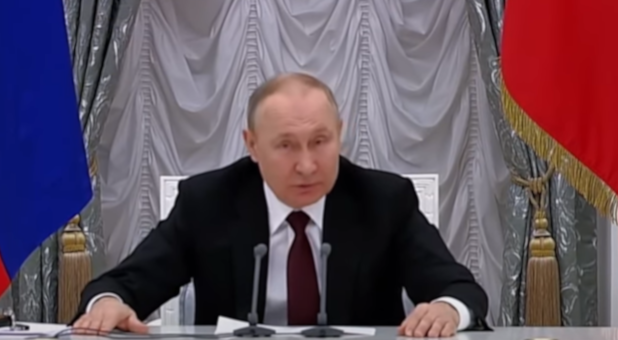Get Ready for Putin’s War Against the Churches
Whatever Vladimir Putin’s political objectives may be in his brutal and unprovoked invasion of Ukraine, Pentecostal and charismatic leaders there believe the Russian president has a religious objective—to close down their churches throughout the country.
Their belief is not without foundation. It is, in fact, based on the behavior of the Russians and their surrogates in Eastern Ukraine when they seized large portions of Donetsk and Luhansk regions in April 2014. Members of Russian special forces and the FSB (Russia’s Federal Security Service, the successor to the KGB) disrupted worship services, closed and ransacked hundreds of evangelical churches, abducted congregational leaders and murdered pastors and priests. In Putin’s Novorussiyia the only approved form of Christian observance is under the control of the Moscow Patriarchate of the Russian Orthodox Church.
In July 2014, the leaders of the evangelical churches of Ukraine issued an appeal to the international community based on more than 100 incident reports collected by church officials. I have worked with a number of these leaders, including the patriarch Filaret of the Orthodox Church of Ukraine (Kyiv Patriarchate). They stood shoulder-to-shoulder condemning Russian atrocities.
Russian special forces interrupted services in five Church of God congregations in Slavyansk on the first morning of the invasion. They arrested Bishop Olexei Demidovich as he stepped into the pulpit to preach, accused him of being a CIA operative, detained him and interrogated Demidovich for seven hours. They expelled the congregation, pushed the children in the church’s orphanage into the street and closed the church’s drug rehabilitation center. At the same time, Russian operatives strode into four other Church of God congregations. Their pastors were executed within an hour.
I have known and worked with Demidovich for more than 20 years. Like most of the Pentecostal pastors in Ukraine whose ministries began in the Communist time, he is not a political man. He is, at his core, a pastor.
The memories of these atrocities are fresh and raw. Church leaders know precisely what Putin’s intentions are towards them. Some Christians in the West may be confused about Vladimir Putin, they are not.
In the few weeks since Putin launched his war against Ukraine, the Russians have repeated the pattern of 2014.
How does one explain Vladimir Putin’s hatred of the Pentecostal and charismatic churches?
Putin holds the Pentecostals and charismatics together with other Protestants responsible for turning Ukraine toward Europe and for their participation in the Orange Revolution of 2004 (a push for democracy there) and the EuroMaidan in 2014 (a protest against government overreach). He knows their commitment to religious freedom and to democracy which he sees as a deadly virus threatening the body politic of Mother Russia. They must be eradicated to prevent the virus from spreading to the Russian people. Russia is only safe when ruled by a strong autocrat who suppresses dissent.
In sharp contrast to the Protestants, who have a tradition of speaking truth to power since the time of Martin Luther and John Calvin, the Russian Orthodox Church has been a key supporter of the Russian state since its inception more than 500 years ago during the reign of Ivan the Terrible. During the Soviet time, most members of the high clergy, including the patriarch, the head of the church, were KGB agents.
According to material from the Soviet archives, the current Patriarch, Kirill, was a KGB agent. This means he was more than an informer, he was an active officer of the organization. Kirill has never acknowledged his ties to the security agencies. Whether or not Kirill has been a KGB agent, he certainly feels compelled to be a voice for the regime, as he was when he stated publicly that the Russian invasion of Ukraine would bring the “prodigal children” of Ukraine home. He conveniently ignores the fact that the Ukrainians are not children and they are certainly not Russia’s children. They are an independent people with a history that predates that of Russia by at least five centuries and Moscow was, in point of fact, founded by a Ukrainian. But being a mouthpiece for the regime carries no obligation to intellectual consistency or integrity.
Putin is correct in his view of Pentecostals, charismatics and other evangelicals. They were in the forefront of the last two revolutions in Ukraine, even as evangelical Protestants supported the American Revolution in 1776. American historians have long recognized that the values of liberty, personal responsibility and opportunity that drove our revolution were popularized in the First Great Awakening of the 1740s.
The moral and spiritual issues could not be clearer. Followers of Jesus around the world must support their brothers and sisters in Ukraine as they seek to live free. We need to support them through prayer in their hour of trial through prayer and provide humanitarian aid.
We must also call Putin’s war against the churches by its rightful name. There are not two sides to this conflict, only one—the side of justice. And we must be on the right side of one of the great moral issues of our time. {eoa}
Gary Kellner is the founder and former executive director of the International Center for Christian Leadership, the first graduate school of leadership studies in the former Soviet Union. He served as the president of Save Ukraine Now, an interdenominational organization supporting the Ukrainian people through advocacy and by providing humanitarian aid during the Russian incursion in 2014.
Read articles like this one and other Spirit-led content in our new platform, CHARISMA PLUS.
















































